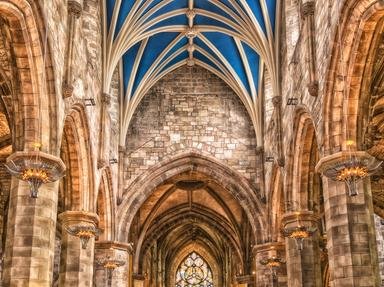Quiz Answer Key and Fun Facts
1. Dear Abbey
I told my friend I visited "Westminister" Abbey. "Ho, ho". She said. "It's 'Westminster' you poor ignorant clod."
"Ha, ha". I replied. "I knew that." But I didn't. What is a minster, anyway?
Laughed At In London
What explanation should Abbey give "Laughed At"?
2. Dear Abbey,
I've been trying to visit all the English abbeys I can, but most of them are in pretty bad shape. In fact, they seem to mostly be ruins. The cathedrals seem to be in much better shape. What happened to the abbeys?
Bewildered in Bath
How should Abbey answer bewildered?
3. Dear Abbey,
I noticed that there are a lot of dead people buried in abbeys. How come? When I asked the docent at Westminster, she just rolled her eyes and said it was because the live people wouldn't stay in the crypts. I'm sure she was right about the live people, but I was asking about the dead ones. Could it have been because they were such pious and dedicated Christians?
Creeped out in Coventry
Why should Abbey give "Creeped" as the reason for dead people being buried in abbeys?
4. Dear Abbey,
The guide at Glastonbury Abbey said that in 1191 monks unearthed bones that they claimed were the remains of Arthur and Guinevere. The guide said historians weren't really sure about the truth of the claim. Are historians really sure of anything about Glastonbury, I mean?
Gullible in Glastonbury
Which of the following is a valid reason Abbey could give?
5. Dear Abbey,
My friend from kindergarten said that a monk is called a "monk" 'cause he looks like a monkey, and an abbot is called an abbot cause he looks like a baboon. Mommy says that's not true but can't tell me where the names came from. Can you?
Aren't I Cute in Canterbury
How should Abbey answer cute?
6. Dear Abbey,
Those monks and abbots were all a bunch of oppressive, repressive, blood sucking, exploiters of the masses. What good did they ever do for the common man? And don't give me any of that spiritual crap!
Too Smart in Tewksbury
What positive achievements of English monasteries could Abbey point out?
7. Dear Abbey,
I've heard that monks practiced celibacy and poverty. Was this true of both Cistercians and Benedictines?
Wondering in Waltham
How should Abbey answer?
8. Dear Abbey,
I've heard that both William Wordsworth and John Milton spent a lot of time together in a monastery. I'm confused because I didn't think the two men even lived in the same century. Did Wordsworth help John Milton write "Paradise Lost"?
Perplexed in Pershore
What answer should Abbey give?
9. Dear Abbey,
This may sound like an odd question, but I read something that worries me. Did English monks really get paid to pray?
Scandalized in Shrewsbury
What would be the most accurate answer Abbey could give?
10. Dear Abbey,
I am very interested in military history and have come across a group called the "White Canons". My local librarian suggested I write you for information about them. Are they a monastic artillery unit?
Munitions-minded in Manchester
What explanation of the White Canons should Abbey give?
Source: Author
uglybird
This quiz was reviewed by FunTrivia editor
bloomsby before going online.
Any errors found in FunTrivia content are routinely corrected through our feedback system.

